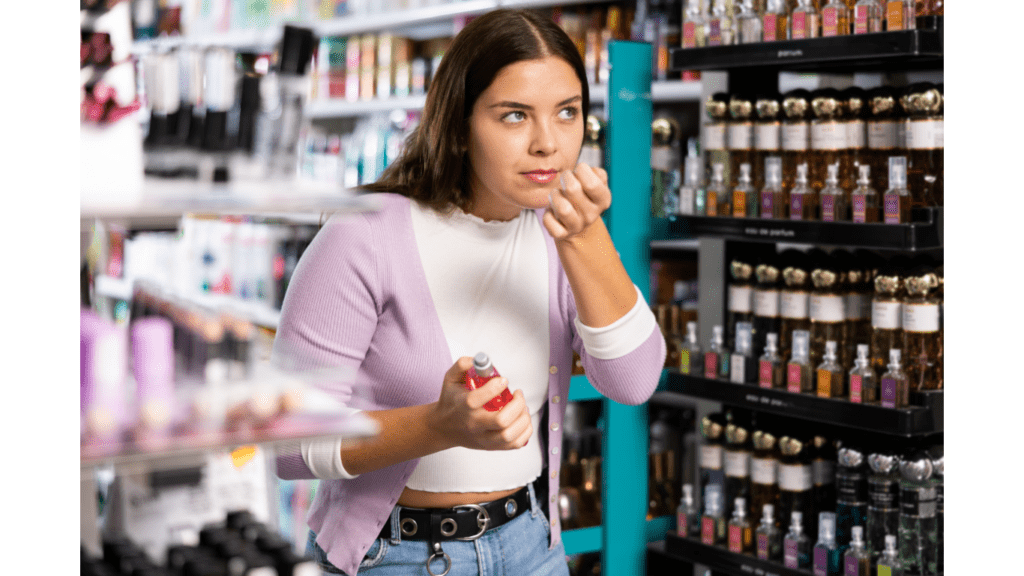The Essence of Scent-sational Beauty
The Psychology Behind Fragrance Choice
- Delving into the psychology of fragrance choice, scents play a pivotal role in personal expression. Our olfactory senses are closely linked to the limbic system, the emotional center of our brain, which explains why certain scents can evoke powerful emotions and memories. For example, the scent of lavender may promote relaxation, while citrus notes can energize and uplift one’s mood. By understanding this connection, individuals can select fragrances that resonate with their emotions, enhancing their overall well-being and self-expression.
How Scents Enhance Personal Style
- Exploring how scents enhance personal style reveals a unique facet of self-expression. Just as one carefully selects clothing to reflect their personality and mood, choosing the right fragrance is an extension of personal style. A sophisticated woody scent might complement a confident and elegant persona, while a floral fragrance could enhance a romantic and feminine aura. The art of selecting the perfect scent not only complements one’s style but also leaves a memorable impression, making it a powerful tool in defining and expressing individuality.
Selecting the Right Fragrance for You
Understanding Fragrance Notes and Accords
- Exploring fragrance notes and accords is vital in finding the perfect scent for you. Fragrances are composed of top, middle, and base notes that work harmoniously to create a unique olfactory experience. Top notes are the initial impression of a fragrance, middle notes unfold and develop after the top notes fade, while base notes linger the longest, forming the foundation of the scent. By understanding these notes and how they interact, you can choose a fragrance that resonates with your personal style and preferences.
The Significance of Seasonal Scents
- The choice of fragrance can be influenced by the seasons. Light, fresh scents are ideal for spring and summer, evoking a sense of vitality and freshness. In contrast, warm, spicy fragrances are well-suited for fall and winter, creating a cozy and inviting aura. Adapting your fragrance to the season not only enhances your overall style but also complements the weather and atmosphere, allowing you to make a statement with your scent all year round.
Crafting Your Scent Profile
The Art of Layering Fragrances
When it comes to crafting my scent profile, the art of layering fragrances is a technique that I find truly captivating. Layering different scents allows me to create a unique and personalized fragrance that resonates with my individuality. By combining multiple fragrances, I can tailor my scent to suit different occasions and moods. It’s like painting with perfumes, blending notes to compose a symphony that is distinctly mine.
Maintaining a Fragrance Wardrobe
In my journey of crafting a scent profile, maintaining a fragrance wardrobe is essential. Just like a fashion wardrobe, having a collection of diverse scents ensures that I am prepared for any event or season. I curate my fragrance wardrobe with a mix of floral, woody, citrusy, and musky scents to cater to various preferences and occasions. Rotating between different fragrances keeps my scent profile versatile and allows me to adapt to different settings effortlessly.
Scent and Socio-cultural Expressions

Perfumes in Historical Contexts
Exploring the role of perfumes throughout history reveals fascinating insights into how scent has been intertwined with socio-cultural expressions. In ancient civilizations, fragrances were emblematic of status, spirituality, and rituals. The use of perfumes in ancient Egypt, for instance, was not only a symbol of luxury but also had religious significance, with scents being associated with the divine. In ancient Rome, perfumes were used lavishly to denote wealth and sophistication, emphasizing one’s social standing and influence. These historical perspectives illustrate the enduring relationship between scent and cultural expression, showcasing the intrinsic link between fragrances and societal norms.
Modern Trends in Fragrance Selection
In contemporary society, the selection of fragrances has evolved to encompass a diverse range of preferences and trends that reflect the dynamic nature of personal expression. Modern consumers gravitate towards a myriad of scent profiles, from fresh and floral to woody and oriental, seeking fragrances that resonate with their unique identities and lifestyles. The rise of niche perfumery has revolutionized the fragrance industry, offering personalized and avant-garde scents that cater to individualistic tastes. Furthermore, the trend of gender-neutral fragrances has gained momentum, breaking traditional scent stereotypes and promoting inclusivity in olfactory choices. The modern landscape of fragrance selection embodies a multifaceted approach to personal expression, emphasizing diversity, creativity, and self-discovery in the realm of scent aesthetics.
The Future of Fragrance in Personal Expression
1. Innovation in Scent Creation
As the fragrance industry continues to evolve, innovation in scent creation plays a crucial role in shaping the future of personal expression through scents. Perfumers are constantly experimenting with unique combinations of ingredients to develop novel fragrances that resonate with diverse consumer preferences. By harnessing cutting-edge technology and contemporary techniques, perfumers can create avant-garde scents that push the boundaries of traditional perfumery.
Innovations such as molecular distillation and synthetic aroma compounds have revolutionized the way perfumes are formulated, allowing for greater creativity and customization in scent creation. By blending natural essences with synthetic molecules, perfumers can craft innovative fragrances that offer longevity, complexity, and distinct olfactory profiles. This fusion of artistry and science paves the way for unparalleled olfactory experiences that cater to individualistic style statements.
Moreover, advancements in sustainable extraction methods, such as carbon dioxide extraction and bio-based ingredients, contribute to eco-conscious scent creation practices. By embracing sustainable sourcing and ethical production processes, perfumers can create environmentally friendly fragrances that align with the values of conscious consumers. The integration of sustainable practices not only reduces the ecological footprint of perfumery but also fosters a more responsible approach to crafting scents for personal expression.
2. The Role of Sustainable and Ethical Perfumery
In the realm of fragrance, sustainable and ethical perfumery plays a pivotal role in shaping the future landscape of personal expression through scents. With an increasing emphasis on environmental conservation and ethical sourcing practices, consumers are seeking fragrances that not only smell exquisite but also align with their values of sustainability and ethics. Sustainable perfumery encompasses various aspects, including responsibly sourced raw materials, eco-friendly packaging, and cruelty-free production processes.
By promoting transparency in ingredient sourcing and production practices, sustainable perfumery ensures that consumers can make informed choices about the fragrances they wear. Ethical perfumery goes beyond creating captivating scents to uphold ethical standards in every stage of the fragrance creation process, from sourcing raw materials to the final product. Through fair trade initiatives and ethical supply chains, perfumers can empower local communities and promote social responsibility within the fragrance industry.
The evolving landscape of fragrance is increasingly characterized by a shift towards sustainable and ethical practices that resonate with the growing demand for conscious consumerism. By embracing sustainability and ethics in perfumery, the future of fragrance in personal expression is not only fragrant but also responsible and empowering.


